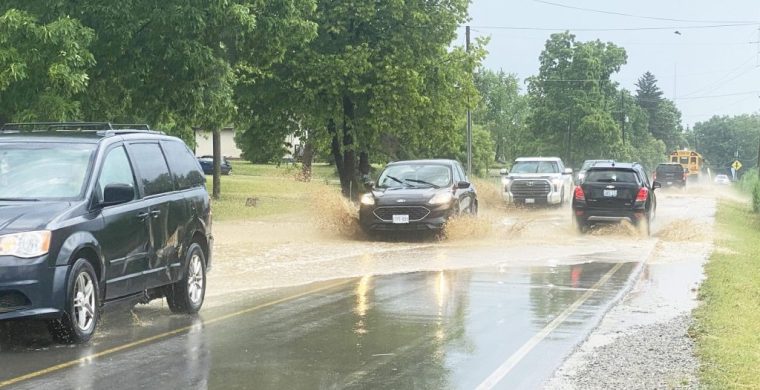Ontario Premier Doug Ford tells First Nations he is sorry
By Lynda Powless Editor TORONTO,ONT- Ontario Premier Doug Ford has apologized for comments he made about First Nations People after First Nation leaders called the remarks “racist” and “deeply hurtful”. In announcing his apology Premier Ford, said “I get pretty passionate, and I just want to say I sincerely apologize for my words, not only if it hurt all the chiefs in that room, but all First Nations,” Ford said Thursday, with First Nations leaders at a news conference. He said “it is important to have consultation.” He said his words were both ” offensive” and “deeply racist.” Ford ‘s apology came after he said Wednesday First Nations should not keep coming “hat in hand” to the government if they say no to mining projects. Ford apologized in a meeting...
Six Nations assessing rain storm damage after flooding hit
SIX NATIONS OF THE GRAND RIVER- Six Nations band administration office is closed with staff working from home after declaring a “state of emergency” Wednesday, (June 18) when severe flooding hit. Six Nations of the Grand River Elected Council (SNEC) announced that, in the wake of a “state of emergency,” it will be assessing support following severe flooding which occurred on June 18. The territory and surrounding area experienced multiple heavy downpours, closing roads and delaying traffic. “Closed Road” signage blocked several parts of the territory the next day, The assessment includes “checking the status of SNGR buildings and gathering information from community members who have been affected by the flooding,” as stated in a press release issued on June 19. It acknowledged that many homes and community buildings have experienced...
AFN releases First National justice strategy, Kahnawake Peacekeepers continue to lead in reform efforts
By Lucas-Matthew Marsh, Local Journalism Initiative Reporter, Iori:wase The Assembly of First Nations (AFN) has released the first national First Nations Justice Strategy (FNJS), in an effort to help guide Indigenous criminal justice system, police and corrections reform across Canada. Developed over a five-year period between First Nations and the federal Department of Justice, the FNJS aims to address systemic inequities in the Canadian justice system that have disproportionately impacted Indigenous peoples. “Canada’s current justice model has failed First Nations Peoples,” AFN Regional Chief Terry Teegee said. But when it comes to Indigenous police reform, the Kahnawake Peacekeepers have been leading the effort in both Quebec and across the country. “There are a lot of areas where we have pushed the envelope to receive additional funding to get additional training,”...
Healing through tradition at the native centre, ‘a cultural home’
By Paige Seburn, Local Journalism Initiative Reporter, The Lake Report Losing her father meant losing her strongest cultural connection. Now, during National Indigenous History Month, Halley Irwin is sharing how she found her way back — and how she’s helping others do the same through cultural programs and events offered at the Niagara Regional Native Centre. “These cultural programs matter so much. They help us reclaim who we are,” said Irwin in an email. Irwin returned to the centre after time away in her teens and early adulthood and is now the director of development and community engagement. Since being back, she said she’s been able to pick up the teachings her father, a Six Nations-born artist, once shared. “Being here at (the Niagara Regional Native Centre) has given me...
From land acknowledgement to land action: hundreds choose to meaningfully recognize Indigenous lands
Lək̓ʷəŋən and W̱SÁNEĆ territories (Victoria, BC), June 19, 2025 — Land is valuable, and so is the idea of home. From historic leafy homes in Saanich and Oak Bay, to new builds and condos in Victoria and Esquimalt, residents on the Island are acknowledging home and Indigenous land in a new way. Working with First Nationsacross the CRD since June 2023, Reciprocity Trusts has supported over 300 homes, small businesses and events on the south island to make more than $165,000 in voluntary payments tied to the value of land. Led by Indigenous trustees from ten south island First Nations, the Trust supports ten beneficiary First Nations: T’Sou-ke, Esquimalt, Songhees, Tsartlip, Tsawout, Tseycum, Malahat, Pauquachin, Scia’new, and Pacheedaht. Private property is a major ongoing impact on indigenous rights, especially in...
Doug Ford says he treats First Nations ‘like gold’ but they ‘keep coming hat in hand’
By Liam Casey Ontario Premier Doug Ford says he is willing to give First Nations what they want for their support in developing mines, but they cannot “keep coming hat in hand all the time to the government” for more money. Ford is set to meet Thursday with several dozen chiefs who are part of Anishinabek Nation, which represents 39 First Nations in the province. First Nations are livid with the province over the passage of Bill 5, which gives cabinet the power to suspend municipal and provincial laws for chosen projects through the creation of so-called special economic zones. The designation of these zones is part of a new omnibus law that Ford’s government says is designed to speed up the construction of large infrastructure projects, particularly mines. Ford...
Prophet River First Nation cancels voluntary evacuation notices
By Ed Hitchins, Local Journalism Initiative Reporter, Energeticcity.ca PROPHET RIVER, B.C. — Rainfall over the past several days in northeast B.C. has prompted one First Nation affected by wildfire to rescind voluntary evacuation orders first issued last week. Prophet River First Nation (PRFN) announced via the community’s LinkedIn page on Tuesday, June 17th that “hard work” from wildfire crews – along with cooler weather and steady rainfall – have allowed the nearest wildfire activity to remain 50 kilometres from PRFN. “[Wildfire activity] no longer poses an immediate risk to our community,” reads the post. “Members can now return home safely. “We’re so proud of how everyone supported each other during this time, whether you hosted family, checked in on neighbours or just stayed alert.” Several wildfires are active south or...
Moe, Smith repeat calls for federal action and support for energy projects
The premiers of Alberta and Saskatchewan say Prime Minister Mark Carney needs to repeal certain energy policies if he wants Canada to have the strongest economy in the G7. Saskatchewan Premier Scott Moe and Alberta’s Danielle Smith told a news conference Wednesday that includes policies such as the West Coast tanker ban and net-zero electricity regulations. Those calls aren’t new for either premier, as both have been vocal about wanting Carney to act on their demands since before the April federal election campaign. Wednesday’s press conference came after Smith and Moe’s governing caucuses met in Lloydminster, a city that straddles the boundary separating the two Prairie provinces. “We have a strong separate identity, but a great deal of commonality,” Smith said before reiterating her long-held demands of Carney, such as...
Marten Falls chief says feds disrespecting treaty rights
By Mike Stimpson, Local Journalism Initiative Reporter, Thunder Bay Source MARTEN FALLS – Prime Minister Mark Carney needs to work with First Nations rather than imposing laws on them, Chief Bruce Achneepineskum said Wednesday. The chief of Marten Falls First Nation, a Treaty 9 nation in the Ring of Fire region, was speaking the day after participating in a rally against Bill C-5 in Ottawa. Asked what he would say to Carney if they were in the same room, Achneepineskum said “I would tell him to try to build a relationship with First Nations and not impose your legislation on us. “It’s about respecting our treaty rights, our Indigenous rights to the land,” he continued. “That’s being ignored. And not only ignored, but put aside. And that doesn’t sit right...
Superior Court rejects town’s claim to park land
By Mike Stimpson, Local Journalism Initiative Reporter, Thunder Bay Source FORT FRANCES – The Town of Fort Frances has been shot down in its bid to establish legal title to Point Park, and former councillor Douglas Judson says they should have seen it coming. “It seems to me and others who have watched this unfold over the past number of years – and this litigation is very old, this started in 1998 when I was in the sixth grade – that this was a difficult case for the town to establish,” Judson said in an interview Wednesday. Ontario Superior Court Justice John Fregeau ruled this week that the municipality can’t claim ownership of the land on which Point Park lies, between Highway 11 and Rainy Lake. Agency One, a group...
Members of Big Stone Cree, Dene Tha’, Loon River and Peerless Trout First Nations evacuated due to wildfires
By Jeremy Appel, Local Journalism Initiative Reporter, Alberta Native News Members of four First Nations in northern Alberta were forced to evacuate due to ongoing wildfires in the region, with no clear date set for a return home. As of June 16 residents of the Dene Tha’ First Nation in Chateh, Big Stone Cree Nation in Lake Chipewyan, Loon River First Nation and Peerless Trout First Nation remain evacuated after being forced from their homes on May 29. The Sousa Creek Wildfire, burning 5 km south of Chateh, has more than quadrupled in size since May 30, reaching 41,242 hectares. Chateh residents have been evacuated to High Level, the nearby Dene Tha’ reserve, Bushe River, and Peace River. The Bushe Four Chiefs Complex has hosted Stanley Cup finals watch parties...
Race for Yukon’s next premier between business insider and former chief
By Ashley Joannou A new premier of Yukon is expected to be chosen by the governing Liberal party on Thursday, leaving the winner with just months to make their mark before a territorial election has to be called. Yukon Liberals will pick the party’s next leader at a convention in Whitehorse to replaced outgoing premier Ranj Pillai, who announced in May that he would be stepping aside once a successor is chosen. An election must be held on or before Nov. 3 in the territory that has been governed by the Liberals since 2016. The leadership race pits party insider and longtime local businessman Mike Pemberton against Doris Bill, the former chief of the Kwanlin Dun First Nation. Pemberton is chair of the Yukon branch of the federal Liberals and...
Pay inequality persists for women, minorities in federal public service: report
By Catherine Morrison While the federal government has made gains on diversity and equity in the public service, inequities persist when it comes to pay, a new Treasury Board report says. Compared with the entire core public service, employees who fall into “equity groups” — women, Indigenous Peoples, visible minorities and people with disabilities — are more likely to fall into the lower income groups and less likely to be among employees making over $100,000 a year. The Employment Equity in the Public Service of Canada report for 2023-24 divides employees into six income groups, starting at those who make less than $50,000 a year and topping out with those who make $150,000 or more a year. The data shows that about one-third of all employees made less than $75,000,...
Minister Rickford sees new Bill 5 as ‘opportunity’ for Indigenous communities
By Jacqueline St. Pierre, Local Journalism Initiative Reporter, The Manitoulin Expositor NORTHERN ONTARIO—Tariffs—the economic thunderclaps shaking supply chains and squeezing profits—becomes the perfect storm that two seemingly opposing parties are reaching into the same toolbox to wield. While federal Bill C-5 and Ontario’s Bill 5 appear to address different policy areas—one focused on “sustainable jobs,” the other on “economic zones”—their timing and structure suggest a shared approach: easing regulatory constraints in order to accelerate private-sector-led development. One sets a national framework; the other operates at the provincial level. The promise: cut the red tape and clear a fast lane for investment to race through. Bill C-5, tabled by the federal government on June 6—just one day after Ontario passed Bill 5—positions itself as a jobs and climate transition strategy. It...
Uniting Brantford’s youth with free sports event
By Kimberly De Jong, Local Journalism Initiative Reporter, Brant Beacon Nearly 40 children participated in the B United Sports Clinic at Waterworks Park on Friday, June 6, 2025. At the event, children ages six to 14 had the chance to learn the basics of soccer, cricket and lacrosse under the guidance of various athletes and coaches, including players from the Six Nations Arrows Jr. A lacrosse team, Cricket Canada and the Brantford Galaxy Youth Soccer Club. “The turnout today has been great, and it’s so wonderful to have a diverse group of kids from all different equity groups within the city out here having fun, running around and just playing together,” said Nicole McKinney, event organizer and Founder of WAKING THE unCONSCIOUS (WtC). “All of the coaches here have been...
Living Lakes Canada launches water mapping projects in Slocan Valley to support wildfire response
By Rachael Lesosky, Local Journalism Initiative Reporter, Valley Voice Living Lakes Canada is collaborating with two Slocan Valley communities to inventory, measure, and map water resources, with the goal of supporting wildfire response. Residents around Winlaw (Pedro Creek to Lemon Creek), and the Red Mountain Road and Enterprise Creek area, are invited to share information about potential water sources and key infrastructure. The project aims to combine local knowledge, water monitoring data, and streamflow modelling to help emergency crews respond quickly and effectively to wildfires. “This is an opportunity for community members to share the information they want BC Wildfire Service – and other response crews – to have in advance, so it can be incorporated into their response plans,” said Paul Saso, hydrology consultant for Living Lakes. The final...
Carney’s contentious major projects bill clears committee
Running roughshod over the environment. Spawning the next Idle No More movement. Picking economic winners and losers. Prime Minister Mark Carney’s Building Canada Act is anything if not a magnet for criticism. The Liberal government’s controversial legislation that would let cabinet quickly grant federal approvals for big industrial projects like mines, ports and pipelines sailed through committee in the early hours of Thursday. A House of Commons panel sat from Wednesday afternoon to after midnight reviewing Bill C-5 in a hurried study, as the Liberal government seeks to pass it through the chamber by week’s end. Indigenous and environmental groups, along with opposition MPs and senators, raised concerns that the bill is being rushed through parliament and will grant cabinet sweeping powers to override other laws to plow ahead with...
Territorial Liberals hold leadership convention to replace Yukon premier
The Yukon Liberal Party will choose its next leader today and he or she will also become the territory’s 11th premier. A leadership convention is being held in Whitehorse where more than 1,000 eligible party members can vote for either Doris Bill, a former Kwanlin Dun First Nation chief, or local businessman Mike Pemberton. They are running to replace outgoing Premier Ranj Pillai who announced earlier this year that he would not be seeking re-election and would step down after his successor was chosen. Eligible voters will be using a ranked preferential ballot and the candidate who receives 50 per cent plus one of the total number of votes will be declared the winner. The next territorial election must be held on or before Nov. 3. The Liberals hold a...
Six Nations hit by severe rainstorms saw flooding across the community
Six Nations and surrounding areas were hit by the first summer rainstorm today (Wednesday June 18 2025) with ditches overflowing onto roadways and parking lots turning into mini-lakes. Chiefswood Road between Fifth and Six Nations lines flooded out slowing traffic and in some cases causing vehicles to stall and left parked by the side of the roadway while front yards of some homes and businesses yards were flooded. Meanwhile Grand River Enterprises found its warehouses turned into islands and ditches and roadways were flooded out. Photos by Turtle Island News photojournalist Jim C. Powless ...
Federal judge to deny Trump administration’s motion to dismiss lawsuit over block on wind projects
By Jennifer Mcdermott And Alexa St. John A federal judge in Massachusetts said Wednesday he plans to deny a motion by the Trump administration to dismiss a lawsuit over its blocking of wind energy projects, siding with a coalition of state attorneys general. Led by New York Attorney General Letitia James, attorneys general from 17 states and Washington, D.C. are suing in federal court to challenge President Donald Trump’s Day One executive order halting leasing and permitting for wind energy projects. Judge William G. Young said during a hearing that he plans to allow the case to proceed against Interior Secretary Doug Burgum, but will dismiss the action against Trump and cabinet secretaries other than Burgum named as defendants. He said he thinks states do have standing to sue, which...











